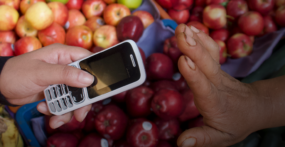Posted on 09 Dec 2020
In this edition of the #CovidCrimeWatch newsletter, published on International Anti-Corruption Day, we feature a number of stories from across the world on the issue of irregularities in the public procurement sector.
By the end of October, it was clear that many countries across the world were experiencing a second wave of the coronavirus pandemic. National lockdowns were reimposed in a number of countries in Europe, including France, Germany and the United Kingdom. Confirmed cases also continued to rise in the US in the period leading up to the presidential election, where a number of Trump campaign rallies contributed to the spread of the virus: research shows that 18 rallies between June and September resulted in more than 30 000 new cases, and likely led to more than 700 deaths. By the beginning of December, the global situation was deteriorating further, with 116 countries reporting more new cases in the 50th week of the year compared to the previous two weeks. While lockdown measures appear to have been successful in reducing the spread of the virus in European countries, and news of the development of several successful vaccines has provided the light at the end of the tunnel, many countries in the Americas, Africa and Asia continue to experience an increase in the number of COVID-19 cases.
In our last #CovidCrimeWatch newsletter, we focused on the consequences of the pandemic on migrant-smuggling flows and human trafficking. We saw how the securitization of borders has obstructed the usual migrant-smuggling routes, forcing migrants towards more dangerous routes (and increasing the profits of the smuggling networks). We also looked at how the pandemic is exacerbating numerous forms of human trafficking, including forced labour, child marriage, online sexual exploitation and the recruitment of children into gangs. The GI-TOC has recently published a report, ‘Gangs in lockdown: Impact of Covid-19 restrictions on gangs in east and southern Africa’, looking specifically at gangs in South Africa and Kenya.
In this edition of the #CovidCrimeWatch newsletter, published in the week of International Anti-Corruption Day, we feature a number of stories from across the world on the issue of irregularities in the public procurement sector. As public contracts for the provision of personal protective equipment (PPE) are being awarded at an unprecedented scale (and speed) to tackle the urgent situation, many governments have suspended their usual funding-accountability and public-procurement rules. While corners have often been cut with the genuine intention of meeting the needs of the population as soon as possible, the health crisis has also provided a perfect opportunity for political elites to game the system in myriad ways.
Alongside this edition of the newsletter, the GI-TOC has also published an article on the impact of the pandemic on extortion in Central America, as well as a briefing exploring the issues being negotiated before the 14th UN Congress on Crime Prevention and Criminal Justice.
Transparency deficit
Recent revelations by the Good Law Project have highlighted a number of potential irregularities in the awarding of public contracts for PPE by the UK government amid the pandemic. Leaked documents show that a number of lucrative contracts to provide PPE to the National Health Service were awarded to companies that had only been established a few weeks earlier. In other cases, public contracts were awarded to companies with dubious financial credibility.
The common factor in all the cases was the existence of personal ties between the companies and the ruling Conservative party. Indeed, there is evidence to suggest, according to the Good Law Project, that the government provided special procurement channels for ‘VIPs’ and government contacts, and that successful contractors were guided through the process by the Cabinet Office.
Questions have also been raised regarding possible favouritism in the involvement of Serco, the private company awarded a £108 million (US$140 million) public contract for contact-tracing work in England, after a leaked email showed that the company had been approached as early as January and was awarded the contract without it being put to an open tender process. Dido Harding – a Conservative peer in the House of Lords, spouse of a Conservative member of parliament (who is the government’s ‘Anti-Corruption Champion’) and head of the government’s track-and-trace system – has also come in for heavy criticism for her awarding of lucrative public contracts without competitive tendering, especially as the failure of the flagship test-and-trace system becomes increasingly apparent.
In Albania, where regular procurement procedures have been suspended since February, public contracts worth millions of euros for PPE and other medical equipment have raised suspicions of corrupt practices and clientelism. For the vast majority of the public contracts awarded since the outbreak of the pandemic, very little information, if any, has been released by the government on the details of the contracts. This lack of transparency, in turn, is a key facilitator of corrupt practices within the public procurement process in Albania. Across the Adriatic Sea, an investigation by the Investigative Reporting Project Italy revealed that state contracts for the provision of various pieces of PPE were awarded to two businessmen who had been accused of various instances of fraud, including the misappropriation of public funds, and money-laundering offences.
In the US, more than US$6 billion has been spent as part of the country’s vaccine-development programme, Operation Warp Speed, but because the contracts are being awarded to private companies via a non-governmental intermediary, they are able to bypass the regulatory oversight and transparency of traditional federal contracting mechanisms. Over the summer, there were numerous reports that millions, if not billions, of dollars of US state funds made their way into the hands of individuals linked to Trump-connected lobbyists, donors and entities linked to Trump family members and associates.
Hard grafters
In South America, a number of countries have been hit by corruption scandals amid the pandemic, not least the economic powerhouse of the continent, Brazil. The Brazilian Congress passed a bill in April that authorized all levels of government to make emergency purchases without tenders or the usual bureaucratic processes, but it quickly became apparent that the system was being abused. In May, police raided the home of Rio de Janeiro’s state governor, Wilson Witzel, who has since been suspended by the Superior Court of Justice. Together with his wife, Witzel is alleged to have coordinated a criminal operation in which payments were made to his wife’s law firm from a company that had won state coronavirus contracts. Meanwhile in Honduras, the procurement process for several mobile hospitals has been mired by allegations of inflated prices, deficient equipment and corruption. Of course, the cost of corruption is not merely a matter of money: in Brazil, a lack of ventilators (due to improper public contracts) has led to several COVID-19 patients dying.
In August, South Africa’s anti-corruption watchdog announced that it was launching an investigation into irregularities in coronavirus-related tenders, including the provision of public contracts at inflated prices, failure to deliver on contracts and the awarding of such contracts to companies and individuals with links to the governing African National Congress party (ANC). One prominent case involves the president’s own spokesperson, Khusela Diko, who in October was referred to the ANC’s provincial disciplinary committee amid a probe into controversial PPE contracts awarded to her husband. In response to the numerous allegations of impropriety, and in line with President Cyril Ramaphosa’s promise to tackle corruption in South Africa, the government quickly set up a ministerial committee to investigate alleged corruption in public contracts related to COVID-19. Furthermore, a Public Procurement Bill has been drafted by the government in an effort to tackle the issue of corruption in public procurement, but it has been criticized for falling short of what is really required.
Scrutiny required
A comprehensive investigation carried out by the Organized Crime and Corruption Reporting Project shows that across Europe, the vast majority of public contracts were awarded with no open bidding process. While we must acknowledge the exigencies of the public-health emergency, it is imperative that we also recognize that the pandemic may be affording opportunities to state actors to line the pockets of their personal contacts. While most states try and maintain the posture of fulfilling transparent procurement policies, sometimes even that is cast aside. In India, a government spokesperson brazenly criticized the controversy surrounding a public fund set up by Prime Minister Narendra Modi, questioning ‘what is this urgent need for public accountability at a time when everyone is busy battling a pandemic?’. To which we might reply, the need is greater than ever, if corrupt criminal practices are not to become further entrenched in the systems of global governance.
The #CovidCrimeWatch archive of news articles from around the world pertaining to organized crime and the COVID-19 pandemic has been updated. Please click below to download the repository, which now hosts 758 articles.
#CovidCrimeWatch is curated by Lyes Tagziria.



